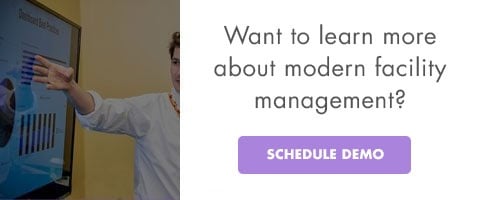Outsourcing Facilities Management: 3 Pros and Cons To Consider


If you’re considering outsourcing facilities management (or at least some aspect of it), you’re hardly alone.
The industry is experiencing what CBRE calls an “outsourcing evolution.” The global market for outsourcing facilities management is on track to reach $1 trillion by 2025, according to CBRE’s latest report, with integrated services accounting for 35 percent of global revenues.
While outsourcing can save money and even add value, the decision to use outside vendors shouldn’t be a knee-jerk reaction. It’s important for workplace leaders to understand what’s driving the increase in outsourcing in facilities management and carefully consider the pros and cons before moving forward.
What’s Driving Outsourcing in Facilities Management?
For many organizations, the decision to outsource facility maintenance, food service and other amenities is no longer purely about controlling costs. According to CBRE, it’s more about a desire to enhance the employee experience and free up their in-house teams to focus on strategic business initiatives.
As leaders focus on creating a more agile work environment, they’re seeking more flexibility in the spaces they lease and how they maintain them. That may include more employees working remotely, the use of coworking spaces and fluctuating space utilization. Facility managers need to be able to equip facility management skills and adapt to meet real-time demands, and outsourcing can help. Here are a few potential benefits to outsourcing facilities management, as well as possible drawbacks.
3 Pros to Outsourcing Facilities Management
1. Better Facilities Management Service Delivery
The best facilities management providers act as an extension of your own team. They typically have specialized training and the processes and technology in place to meet your needs efficiently—sometimes faster than your in-house team, who are accustomed to being the “Jacks” and “Jills” of all trades.
If your facilities management team is already stretched thin and your company is expanding to a new region, it might make more sense to outsource the facility maintenance of the new locations to a nearby vendor, rather than hiring more in-house team members or redistributing them.
2. More Variety and Flexibility
Today’s employees and tenants expect more than just clean restrooms and adequate lighting. They’ve become accustomed to workplace amenities like standing desks, outdoor spaces, fitness centers, better on-site dining options and even convenience services like dry-cleaning or package drop-off and pickup. These amenities can enhance the employee experience, but they also add to your team’s workload. Outsourcing some of these services allows your in-house team to stay focused on other priorities. It also makes it easier to test services and amenities at just one or two locations before rolling them out to the rest of your organization.
3. Cost Savings
Cost savings may not be the primary motivation to outsource facilities management services anymore, but it’s still one of the most attractive benefits. Outsourced vendors often have more experience in specific areas, access to more resources and best practices they’ve developed over time, which can help you keep costs in check.
Vendors also absorb employee costs such as benefits, training, and workers’ compensation. In addition, they are able to offer career path options that keep the staff salary range in line with the service provided.
3 Cons to Outsourcing Facilities Management
1. Opinions of Employees or the Public
Outsourcing facilities management can generate negative opinions and feedback from employees, the public or both. This is especially true if the task that is being outsourced was previously completed by your employees in-house. Outsourcing facilities management has the perception of whittling the job pool down, which could be a source of contention. This is especially true in regions that are experiencing slower than normal job growth.
2. Lack of Organizational Knowledge
While the employees provided by your vendors may be well-trained and highly competent, they might not be as well-versed when it comes to understanding your company culture and unique organizational dynamics. In addition, these employees could lack the passion and drive for the business that a full-time employee could possess.
3. Lack of Quality
Depending on the vendor, it is possible that quality of the work product will suffer. When trusting a vendor with outsourced work, it is imperative that specific, measurable goals are laid out. These goals must be reached by utilizing concrete processes. If these are not specifically spelled out and agreed to, the quality and service provided by your facilities management vendors could fall far below expectations.
Making Data-Driven Decisions About Outsourcing
As FMs take on more strategic roles and organizations adapt new ways of working, outsourcing some aspects of facilities management can improve agility and scalability. However, it’s important to ask the right questions and research all viable options before making the decision.
Whether you decide to outsource some facilities management services or continue to handle them in-house, you need to have an accurate picture of your facilities management needs to maximize ROI. Using an integrated workplace management system (IWMS) and IoT sensors will give you the real-time space utilization data you need to determine the right mix of in-house and outsourced services. For instance, you can see how many people are actually in the office on any given Wednesday so you can adjust your maintenance schedule and food services accordingly.
Learn more about how to make data-driven decisions in your workplace, schedule a demo or get started for free.
Editor’s Note: This blog post was originally published in September 2014 and has been updated for accuracy and relevance.



